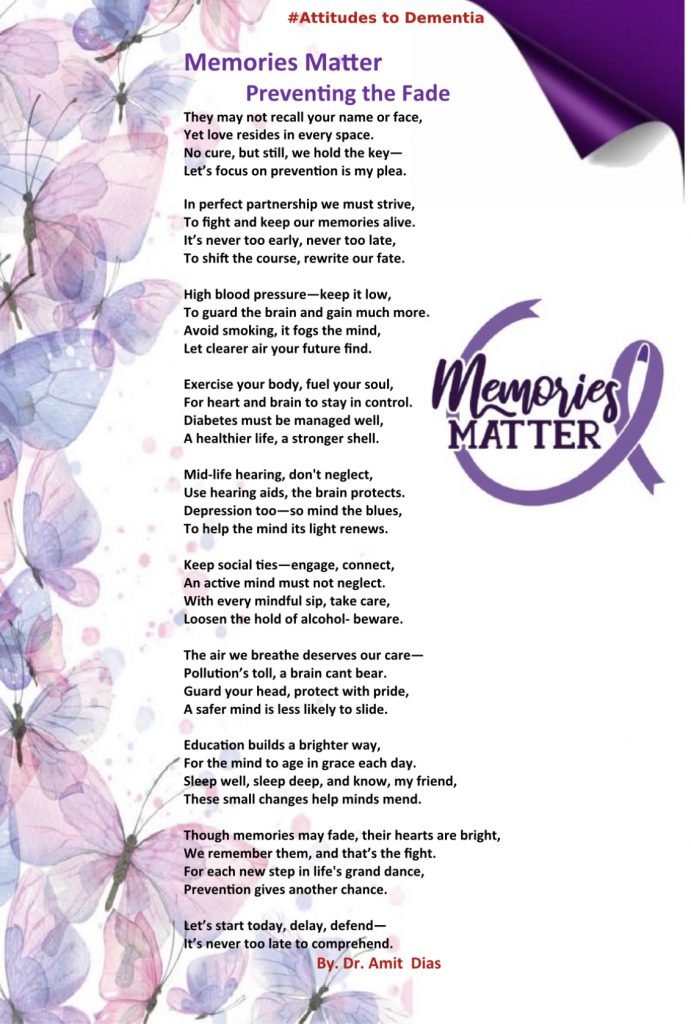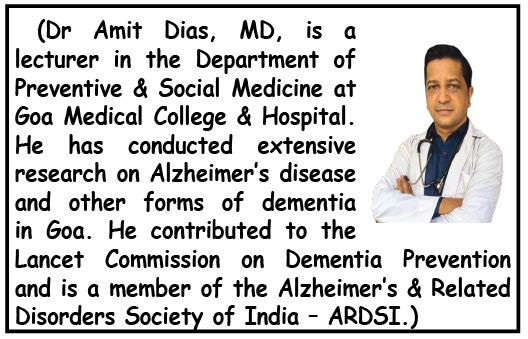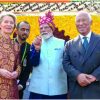Goa is abuzz with excitement as vintage bike and car owners, users, collectors and fans are decking […]

ATTITUDE towards DEMENTIA!
MIND & BODY, HEART & SOUL, Sep 21- Sep 27 2024 September 20, 2024A World Alzheimer’s Day Special!
September 21 September is World Alzheimer’s Day. We asked DR AMIT DIAS about it and got some insightful answers on various aspects of a complex neurodegenerative disease. He says, “We need to change our attitude towards dementia and focus on improving the quality of life of the person with dementia and their caregivers.” Do not forget to share this interview with your friends and loved ones.
A Q&A interview with Dr Amit Dias
Goan Observer: Let’s start with the very basic, what exactly is dementia?
Dr Amit Dias: Dementia is an umbrella term that describes a collection of symptoms affecting cognitive functions like memory, thinking, problem-solving and social abilities. It’s caused by various underlying conditions, including Alzheimer’s disease (the most common form), vascular dementia, Lewy body dementia, and frontotemporal dementia. Over time, dementia leads to a significant decline in a person’s ability to perform everyday tasks, ultimately affecting their independence.
Importantly, dementia is not a part of normal aging. We must shift our attitudes towards dementia, fostering empathy and understanding to build more inclusive, dementia-friendly communities.
Q: The theme this year is “Attitude to Dementia.” Can you explain why changing our attitude is so important?
A: This year’s theme, “Attitudes to Dementia,” emphasizes the need to re-evaluate how we perceive dementia and those affected by it. Stigma, misconceptions and indifference still dominate many people’s views on dementia, making it harder for both individuals living with dementia and their caregivers, to navigate life with dignity. Changing our attitude can profoundly impact their quality of life by promoting understanding, respect and timely care.
I often share what I call the “Be-Attitudes” in dementia care. These are guiding principles for supporting those with dementia:
• Be Patient
• Be Compassionate
• Be Present
• Be Grateful
• Be Accepting
• Be Hopeful
• Be Kind to Yourself
These principles help create a nurturing, positive and supportive environment for people with dementia and their caregivers.
Q: Is all forgetfulness a sign of dementia?
A: Absolutely not! Everyday forgetfulness, such as misplacing your keys or forgetting a date, is normal and happens to everyone. For example, you might forget the date and check your phone or calendar to remind yourself — that’s perfectly fine.
However, people with dementia often experience more severe memory issues. For instance, they may completely lose track of time, the seasons or even where they are. Forgetting recently learned information, relying heavily on others to keep track of appointments, and placing items in odd locations—like slippers in the fridge—are common signs of dementia. Additionally, while age-related vision problems are normal, people with dementia may struggle to understand what they see, even when their eyesight is fine.
Q: How can one recognize Alzheimer’s disease?
A: Alzheimer’s disease can be recognized by a combination of symptoms, many of which are shared with other types of dementia. You can check out the common symptoms of dementia, mentioned in the infographic on DEMENTIA. Scientifically we use the 5 As of Dementia to explain the core symptoms:
• Amnesia – Memory loss, starting with recent memories.
• Anomia – Difficulty recalling names or words.
•Apraxia – Difficulty performing tasks due to misuse of objects (e.g. using a toothbrush as a comb).
• Agnosia – Inability to recognize familiar objects, sounds, or people.
• Aphasia – Difficulty expressing oneself or understanding speech.
These symptoms manifest differently in each person, which is why dementia affects everyone in unique ways. Recognizing the signs early can lead to better care and support for the individual.
Q: Can dementia be prevented? If so, what’s the secret to prevention?
A: Yes, dementia can be prevented — or at least delayed — and it’s no secret. Increasingly, dementia is viewed as a lifestyle-related condition, and there’s growing evidence to support this. I was fortunate to be one of the co-authors of the Lancet Commission Report on Dementia Risk Reduction, which identifies 12 modifiable risk factors for preventing dementia.
These include:
- Physical activity – Regular exercise.
- Cognitive engagement – Challenging your brain through learning and problem-solving.
- Social connections – Maintaining strong social bonds.
- Healthy diet – A heart-healthy diet also benefits the brain.
- Managing hypertension and diabetes.
- Hearing loss – Using hearing aids when needed.
- Avoiding smoking and reducing alcohol intake.
- Preventing head injuries.
- Addressing depression.
- Improving air quality.
- Maintaining a healthy weight.
- Quality sleep – Ensuring sufficient and restful sleep.
The mantra is, “It’s never too early and never too late” to start making changes. Adopting a healthier lifestyle can significantly reduce your risk of dementia. I have included this information in a poem called “Memory Matters” to make it more interesting.
Q: What is your message for our readers?
A: My message is simple: “Do not forget those who cannot remember.” People with dementia and their caregivers need our understanding and support. By changing our attitude toward dementia, we can improve the lives of millions of people. At the same time, we should also focus on our own lifestyle choices to reduce the risk of developing dementia.
Let’s work together to create a dementia-friendly society where no one feels isolated or “forgotten.”
















